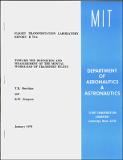Toward the definition and measurement of the mental workload of transport pilots
Author(s)
Sheridan, Thomas B.; Simpson, R. W.
DownloadFTL_R_1979_04.pdf (4.375Mb)
Metadata
Show full item recordAbstract
This report describes work performed in the first year of a continuing research project aimed at developing useful methods for measuring the workload of pilots operating aircraft in the ATC system. Good methods of measuring mental workload of human operators are needed to evaluate the introduction of new technology and new procedures in the man-machine environment. The present research is concentrating on developing subjective assessment methods for any phase of an IFR (Instrument Flight Rules) flight and any crew station on the flight deck. One of the results achieved in the first year is an expanded conceptual structure which allows a more precise definition of terms and assumptions in defining pilot mental workload in a multi-task environment. A second area of research has concentrated on reviewing the alternative approaches to developing a measurement scheme for workload, with some emphasis on the subjective assessment approach. A tentative result in this area is the generation of a prototype subjective rating method for IFR pilot workload modeled closely on the Cooper-Harper rating developed in 1969 to evaluate aircraft handling qualities. This scheme and others will be tested in a transport aircraft simulation during the coming year. If successful, it will be used in a variety of cockpit simulators at NASA research centers (Ames and Langley) and FAA NAFEC as part of a joint research program to evaluate cockpit display of traffic information.
Description
January 1979 Includes bibliographical references (p. 69-72)
Date issued
1979Publisher
Cambridge, Mass. : Massachusetts Institute of Technology, Dept. of Aeronautics and Astronautics, Flight Transportation Laboratory, [1979]
Other identifiers
06449797
Series/Report no.
FTL report (Massachusetts Institute of Technology. Flight Transportation Laboratory) ; R79-4
Keywords
Air pilots, Stress (Psychology), Aviation psychology, Human engineering, Aeronautics, Airplanes, Human factors, Piloting